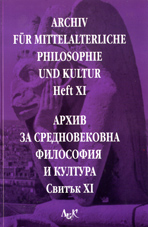Types of Infinity in Roger Bacon's Opus Majus
Types of Infinity in Roger Bacon's Opus Majus
Author(s): Peter BenbowSubject(s): Philosophy
Published by: Издателство »Изток-Запад«
Summary/Abstract: The thirteenth and particularly the fourteenth century were ones of investigation into the nature of infinity and its application to God. In his Opus Majus, Roger Bacon employs infinity in his program to integrate philosophy into theology. He considers three types of infinity: mathematical, physical, and divine. Bacon rejects material infinity on what he considers logical grounds, but is clearly intent on eliminating a competitor to God's infinity. He presents several geometric arguments that purport to demonstrate the absurd consequences of actual infinity. These arguments are circular and merely confirm Bacon's assumptions. Divine infinity is, to Bacon, the only real infinity. Bacon's position on infinity is similar to later thinkers in the Franciscan order. His theology restricts any but the most anti-actual or anti-hierarchical interpretation of infinity. Infinity is maintained exclusively in the service of Christian theology and at the same time remains Aristotelian in nature.
Journal: Архив за средновековна философия и култура
- Issue Year: 2005
- Issue No: 11
- Page Range: 205-217
- Page Count: 13
- Language: English
- Content File-PDF

